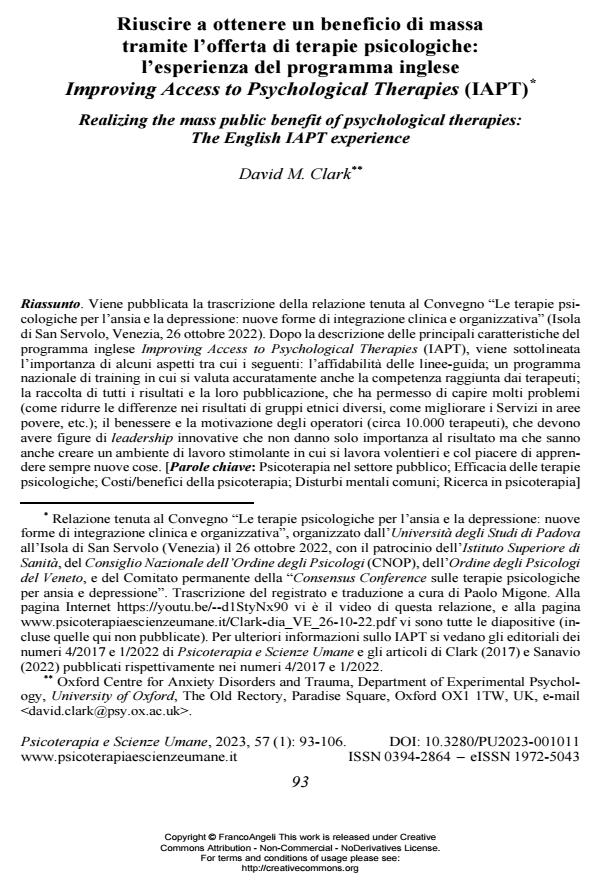Improving Access to Psychological Therapies (IAPT)* Realizing the mass public benefit of psychological therapies: The English IAPT experience
Journal title PSICOTERAPIA E SCIENZE UMANE
Author/s David M. Clark
Publishing Year 2023 Issue 2023/1
Language Italian Pages 14 P. 93-106 File size 275 KB
DOI 10.3280/PU2023-001011
DOI is like a bar code for intellectual property: to have more infomation
click here

FrancoAngeli is member of Publishers International Linking Association, Inc (PILA), a not-for-profit association which run the CrossRef service enabling links to and from online scholarly content.
The transcription of a paper given at the meeting "Psychological therapies for anxiety and depression: New forms of clinical and organizational integration" (Island of San Servolo, Venice, Italy, October 26, 2022) is published. After the description of the main characteristics of the English program Improving Access to Psychological Therapies (IAPT), the importance of some aspects of the IAPT program are discussed, such as the following, among others: the reliability of guidelines; a national training program in evidence-based psychological therapies where also the therapists’ competence is carefully evaluated; the collection and publication of all outcome data, that allowed the understanding and the solution of many problems (e.g., the differences in outcome among ethnic groups, the improvement of services located in socially deprived areas, etc.); the wellbeing and the level of motivation of the psychological therapists (about 10,000) employed in the IAPT services, where there should be leadership figures who do not give importance solely to treatments outcomes but are also able to create a stimulating and innovative environment characterized by the pleasure of working together, improving and learning new things.
Keywords: Psychotherapy in the public sector; Efficacy of psychological therapies; Cost/effectiveness of psychotherapy; Common mental disorders; Psychotherapy research
- Beck A., Naz S., Brooks M. & Jankowska M. (2019). Improving Access to Psychological Therapies (IAPT). Black, Asian and Minority Ethnic Service User Positive Practice Guide. Internet: -- https://lewishamtalkingtherapies.nhs.uk/wp-content/uploads/2021/10/IAPT-BAME-PPG-2019.pdf.
- Clark D.M. (2017). Il programma inglese Improving Access to Psychological Therapies (IAPT). Psicoterapia e Scienze Umane, 51, 4: 529-550.
- Clark D.M., Canvin L., Green J., Layard R., Pilling S. & Janecka M. (2018). Transparency about the outcomes of mental health services (IAPT approach): An analysis of public data. Lancet, 391, 10121: 679-686. DOI: 10.1016/S0140-6736(17)32133-5.
- Clark D.M., Wild J., Warnock-Parkes E., Stott R., Grey N., Thew G. & Ehlers A. (2022). More than doubling the clinical benefit of each hour of therapist time: A randomised controlled trial of internet cognitive therapy for social anxiety disorder. Psychological Medicine, 15 July 2022: 1-11. DOI: 10.1017/S0033291722002008
- Gruppo di lavoro “Consensus sulle terapie psicologiche per ansia e depressione” (2022). Documento Finale della Consensus Conference sulle terapie psicologiche per ansia e depressione (Consensus ISS 1/2022): -- www.iss.it/documents/20126/0/Consensus_1_2022_IT.pdf (edizione inglese: Final Document of the Consensus Conference on Psychological Therapies for Anxiety and Depression: -- www.iss.it/documents/20126/0/Consensus_1_2022_EN.pdf).
- Gruber J., Lordan G., Pilling S., Propper C. & Saunders R. (2022). The impact of mental health support for the chronically ill on hospital utilisation: Evidence from the UK. Social Science & Medicine, 294: 114675.
- Gyani A., Shafran R., Layard R. & Clark D.M. (2013). Enhancing recovery rates: Lessons from year one of IAPT. Behaviour Research and Therapy, 51, 9: 597-606.
- Layard R. & Clark D.M. (2014). Thrive: How Better Mental Health Care Transforms Lives and Saves Money. Foreword by Daniel Kahneman. Princeton, NJ: Princeton University Press (trad. it.: Il potere della terapia psicologica. Come migliorare la vita delle persone e della società. Prefazione di Paolo Michielin. Firenze: Giunti, 2022).
- National Collaborating Centre for Mental Health, editor (2021). The Improving Access to Psychological Therapies Manual, Version 5 (August 2021): -- www.england.nhs.uk/wp-content/uploads/2018/06/the-iapt-manual-v5.pdf.
- Research Group for Treatment for Anxiety and Depression (2017). Psychotherapies for anxiety and depression: Benefits and costs. Research in Psychotherapy: Psychopathology, Process and Outcome (RIPPPO), 20, 2: 131-135.
- Sanavio E. (2022). Una Consensus Conference sulle terapie psicologiche per ansia e depressione. Psicoterapia e Scienze Umane, 56, 1: 11-20. DOI: 10.3280/PU2022-001002
- Saunders R., Buckman J.E.J & Pilling S. (2020). Latent variable mixture modelling and individual treatment prediction. Behaviour Research and Therapy, 124: 103505.
- Saunders R., Cape J., Fearon P. & Pilling S. (2016). Predicting treatment outcome in psychological treatment services by identifying latent profiles of patients. Journal of Affective Disorders, 197: 107-115.
- Toffolutti V., Stuckler D., McKee M., Wolsey I., Chapman J., Pimm T.J., Ryder J., Salt H. & Clark D.M. (2021). The employment and mental health impact of integrated Improving Access to Psychological Therapies: Evidence on secondary health care utilization from a pragmatic trial in three English counties. Journal of Health Services Research & Policy, 26, 4: 224-233. DOI: 10.1177/1355819621997493
- Sul rinnovamento della psicoanalisi Giorgio Meneguz, in PSICOTERAPIA E SCIENZE UMANE 2/2023 pp.213
DOI: 10.3280/PU2023-002003 - Il burnout del terapeuta Margherita Spagnuolo Lobb, in QUADERNI DI GESTALT 1/2023 pp.7
DOI: 10.3280/GEST2023-001001 - Un New Deal per le terapie psicodinamiche: lo psicoanalista come burocrate di strada Jeremy Clarke, in PSICOTERAPIA E SCIENZE UMANE 2/2024 pp.199
DOI: 10.3280/PU2024-002002
David M. Clark, Riuscire a ottenere un beneficio di massa tramite l’offerta di terapie psicologiche: l’esperienza del programma inglese. Improving Access to Psychological Therapies (IAPT) in "PSICOTERAPIA E SCIENZE UMANE" 1/2023, pp 93-106, DOI: 10.3280/PU2023-001011